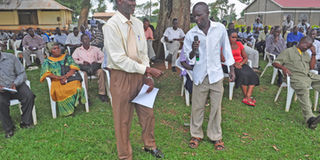What happens at a Baraza?

Community members ask the Iganga District Health Officer, David Muwanguzi, about the state of health service delivery in the district. Photo by Ivan Okuda.
What you need to know:
Although we have heard about barazas, not many people attend them and therefore not many know what takes place during one. Our reporter attended one in Iganga and narrates what took place.
The place was Iganga District. In Namungalwe Sub-county to be particular. On a fairly hot Thursday afternoon, here is where emotions would flare, with the bosses of the district sweating in the dock of public scrutiny. And the public on its part, releasing their bitterness and disappointment. With occasional credit to where it was due.
I had never attended a baraza. Or even thought of attending one. Least of all taken them seriously. All I thought is that they were channels through which the ruling party spread their propaganda. But this one was one full of surprises, pleasant surprises, courtesy of corruption watchdog, Anti-Corruption Coalition Uganda (ACCU), that organised it.
“I don’t want partisan politics, I am giving you, the wanainchi, space to air your views and hold your district leaders accountable,” the Resident District Commissioner Iganga said, at the start of the event that attracted virtually all political and technical leaders of the district.
That in itself was a shock for me. How the Chief Administrative Officer, RDC, District Health, Education, Water and Natural Resources Officers and Naads officials would make it for an event on a working day was nothing short of miraculous. I have always felt that most Ugandans are good at giving any sort of excuse to get out of things. So to see all these seated in a tent with the RDC, staring at the wanainchi of all ages and classes, some perched on trees to catch a glimpse of the big men, was impressive.
On Naads programme
And then came dock time. Time to lay down what one’s office received from the government and break down, as matter of observing ground rules, in the simplest terms possible how every coin was or will be spent. With the public this time round doing the auditing based on their observations.
The most interesting person was the Naads official who came with a list of 12 beneficiaries of the government programme to assist farmers by availing them skills and inputs for modern farm production.
The list was received with boos and jeering then heckling and loud insults. One felt the public frustration and anger. Reason? None of the beneficiaries was from the sub-county and, “the local man doesn’t feel the programme even when it has a sign post, a giant one at that,” as ACCU’s Glady Nairuba put it. All their beneficiaries, it emerged, were officials running the programme.
Health
Considering that Busoga has gained a reputation in the past few years as the land of jiggers, I couldn’t wait to hear what the district health officer had to say. An old man, looking haggard and stressed emerged out of a chair and walked to the stage. Another round of boos, insults and protests from everyone in the wanainchi section. Each word he said was received with outright bitterness as though he was the devil’s spokesman, trying to convert staunch Christians.
“We shall complete the construction of ……by the end of ….” One could barely hear him as his strained voice got swallowed up in the crowds. The drama that nailed it was when he was tasked to present his medical team who he first insisted, “cannot turn up as they are tied up by duty”. When the old doctor finally brought them forward, residents practically pulled nurse by nurse to the RDC and ACCU table, confirming: “These ones serve us, the others we have never seen. They just get government money.”
Education
If you thought the ordinary Ugandan cares less about education, then think twice. The DEO perhaps got the hardest time, with residents including teachers, parents and students openly telling him off about how they did not see anything in his budget anywhere in the sub-county.
It was so inspiring to see an elderly man with a disability walk to the rostrum, line up for the microphone, and speak his mind on the gaps of the education office. Even more inspiring was seeing students braving the heat and hunger to question the money allocated to their sector.
At this point, I felt Uganda was getting there! Where leaders are openly criticised without going political, tribal or religious and they taking the criticism with humility. And receiving the credit with equal humility. One man that got applause for instance, was from the district infrastructure committee. As the district engineer shared progress on roads and bridges in this sub-county, the crowd nodded in unison with some standing to affirm the developments.
Drama
Of course the baraza did not come without that person who entertains more than he raises real issues. This one was a chubby and shabby man who stuck to politics. His was to ask questions for the sake of being heard and seen but more importantly, rub in the, “One Uganda, One people,” mantra.
“A partner in crime” was a seemingly drunk middle aged man who went native with matters of incompetence, virtually flexing muscles with the officials.
At the end of the baraza, politics had still sneaked in but there was every effort to stick to issues, issues that concern the ordinary man, issues that brought more than 500 residents to a primary school playground for three hours to listen and be heard.
“That tolerance of criticism, the objectivity and holding leaders publically accountable is inspiring and will move Uganda,” as Cissy Kagaba, the Executive Director of ACCU asserted in her closing remarks.




